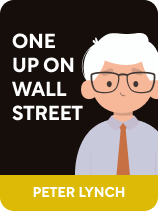

This article is an excerpt from the Shortform book guide to "One Up On Wall Street" by Peter Lynch. Shortform has the world's best summaries and analyses of books you should be reading.
Like this article? Sign up for a free trial here.
Are you looking for One Up on Wall Street quotes by Peter Lynch? What are some of the most noteworthy passages worth revisiting?
In One Up on Wall Street, Peter Lynch offers advice on how individual investors can beat the pros by using what they already know. Using easy-to-understand terminology, Lynch distils his own investing philosophy that is premised on picking stocks based on your risk tolerance, doing your due diligence, and sticking with your stocks through the hard times.
Here’s a selection of One Up on Wall Street quotes with explanations.
One Up on Wall Street: How to Use What You Already Know to Make Money in the Market
In One Up on Wall Street, legendary investor and former manager of the Fidelity Magellan Fund Peter Lynch describes a no-nonsense approach to the stock market. Rather than following the complex predictions of so-called professionals or leaping on the latest and greatest overpriced stock, he advises you to keep your own counsel, be self-reliant, and see yourself as your greatest resource.
The following One Up on Wall Street quotes highlight some of the key pieces of Lynch’s investing advice:
“By putting your stocks into categories you’ll have a better idea of what to expect from them.”
How you invest in a stock depends on what type of stock it is, and it’s important to understand the type before you invest. This ensures you have correct expectations of that company’s performance and won’t sell a stock in a company type prematurely. Lynch divides all stocks into six categories:
Slow-growth companies: Most companies that start out as fast growers eventually become slow growers. Lynch doesn’t particularly recommend investing in slow-growth companies because you won’t make money fast.
Dependable companies: These are large, established companies that grow more quickly than slow-growth companies but still maintain a relatively slow pace. It’s good to have a few dependables in your portfolio because they’ll keep you afloat in market downswings since they generally aren’t as strongly impacted by such swings as smaller companies are.
Fast-growth companies: These companies are small and grow aggressively, at 20 to 25% per year. Such companies also tend to be tenbaggers or higher. These companies are riskier than dependable companies.
Cycle companies: These are companies that grow and contract in cycles. Such companies can be dangerous for inexperienced investors if they don’t understand when’s the best time to invest and that a downswing will be followed by an upswing.
Underdog companies: These are companies that are experiencing a low-growth moment but will soon make a rapid comeback and are therefore worth investing in when stocks are low.
Hidden-treasure companies: These are companies that have an asset you happen to know about but which professional investors have overlooked. An asset might be cash, real estate, a subscription model, or some other hidden advantage. It takes inside knowledge to know this advantage.
“The trick is not to learn to trust your gut feelings, but rather to discipline yourself to ignore them. Stand by your stocks as long as the fundamental story of the company hasn’t changed.”
Lynch stresses the importance of discipline and resilience to stick with your stocks through their ups and downs (rather than selling at the first sign of a downturn), thereby increasing your chances of making a good return on your investment.
“My advice for the next decade: Keep on the lookout for tomorrow’s big baggers. You’re likely to find one.”
According to Lynch, as an investor, your goal should be to find a tenfold increaser (what he calls a tenbagger): a stock that makes you back 10 times what you invested. A tenfold increaser dramatically improves your return and helps erase the effect of a bad investment. You can find such companies anywhere and probably encounter two to three a year in daily life.
(Shortform note: If you’re an ambitious investor, you might even want to look for “multi-baggers”: stocks that return over 10 times the initial investment. However, most stocks considered multi-baggers these days are companies Lynch would probably advise against investing in because they’re not companies you encounter in your everyday life (and that you can understand easily—a point of Lynch’s we’ll cover later in this guide). For instance, Yahoo! Finance recommends investing in Occidental Petroleum Corporation, “an American hydrocarbon exploration company.” It’s unlikely the average investor has a firm understanding of what this company does and would therefore struggle to follow the company’s progress.)

———End of Preview———
Like what you just read? Read the rest of the world's best book summary and analysis of Peter Lynch's "One Up On Wall Street" at Shortform.
Here's what you'll find in our full One Up On Wall Street summary:
- Why individuals fare better in the stock market than professionals and firms
- A no-nonsense approach to the stock market
- Why you shouldn't follow the complex predictions of so-called professionals






